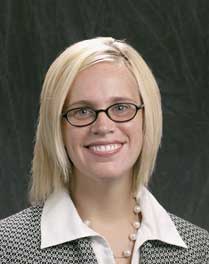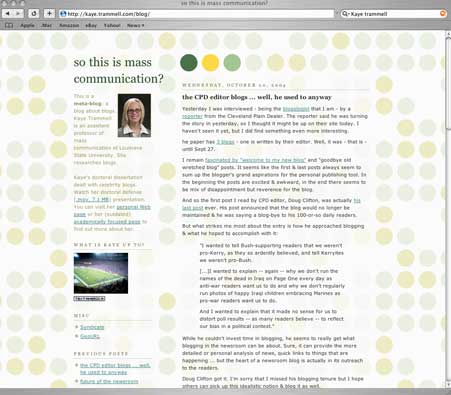|
|
|
 |
|---|
Kaye Trammell |
"I went into the Ph.D. program just wanting to do a little study on what I was seeing on Wheaton's blog," Trammell says today with a laugh. "That little study turned into a dissertation."
Blogs are essentially online journals, where users post diary entries about their personal experiences or hobbies. They can be about anything: TV shows, mountain biking, sex or furry animals. They started popping up on the Internet in 1997, and by 2003 there were more than 4 million blogs in cyberspace.
The more she read celebrity blogs, the more Trammell realized the unique potential for research in the area.
"Blog was still a word not many people understood, yet there was such a vibrant community of celebrity bloggers and their readers online," Trammell says. "As I kept developing this idea of how to study the phenomenon, my interest kept growing."
For her dissertation, Trammell studied 47 blogs (and more than 700 posts) during a 10-month period to see what makes them tick.
"I did a 2-phase study: content analysis of celebrity blog posts … and a survey of blog readers," Trammell says. "I found all the celebrity blogs I could through popular press reports and Internet searches - at the time, 47 was my known universe."
Trammell sampled 10 percent of each celebrity's posts, then contacted all the celebrity bloggers that had an e-mail address listed and asked them to post a blurb and link to her survey. Three did: journalist Dave Barry, director Roger Avary and Wheaton.
Trammell's study found that 41 percent of the posts talked about the blogger's feelings or thoughts, more than a third of the posts described bloggers' experiences and nearly a quarter of the posts discussed a recent news item or event. The most unexpected and intriguing statistic was that 18 percent of the content on the celebrity blogs studied contained political messages.

Political blogs have become increasingly influential in recent years. Just hours after CBS News reported that new documents raised questions about President George Bush's military service, bloggers were questioning the authenticity of the documents based on the typeface used in them. Former presidential candidate Howard Dean used blogs very effectively in his campaign, and for the first time bloggers were given media credentials to this year's Democratic and Republican conventions.
"This move sent a message that blogs are legitimate forms of information for American voters," Trammell says.
But it turns out that political messages aren't limited to political blogs.
"The fact that nearly 20 percent of the blog posts I analyzed contained political messages is astounding," Trammell says. "These are not openly political forums, yet politics seeps into these everyday life conversations. We're in a world where celebrities are held up on very high pedestals; for some reason we care about politics of celebrities."
While celebrities are discussing their everyday lives and events, they are also weaving their political views into their messages.
Barbara Streisand blogs. So does rocker Marilyn Manson, political talk show host Bill Maher and filmmaker Michael Moore. And all of these celebrities discuss their political views freely.
"At the same time celebrities are becoming more vocal with political statements, there are other societal changes in regard to political communication," says Trammell. "The Internet is becoming a hotbed for political communication, activism and two-way conversations."
For Trammell, her entry into the blogosphere, as it is known, has paid valuable dividends. She has been quoted about blogging in numerous printed and online publications and was invited to attend the prestigious Oxford Internet Institute. She was a speaker at last year's BloggerCon seminar at Harvard University and is helping to organize a BloggerCon in New Orleans, near her new home at Louisiana State University, where she was hired as an assistant professor.
Trammell says blogs are so unique because they allow the average person and the celebrity to communicate on the same level, free of charge.
"I think blogs provide a new type of interactivity and voice in the political system," she says. "Not only can you get a more personalized view of political policy, but average citizens can have their voices heard."
Jessica Gordon
Best Blogs
Forbes magazine recently ranked some
of the best blogs on the Web.
Politics
Decembrist
markschmitt.typepad.com
Wonkette!
www.wonkette.com
Poliblog
www.poliblogger.com
Photos
Catherine Jamieson
www.catherinejamieson.com
Daily Dose of Imagery
wvs.topleftpixel.com
Quarlo
www.quarlo.com
Technology
Slashdot
www.slashdot.org
Tech Dirt
www.techdirt.com
Gizmodo
www.gizmodo.com
Sports
Bad Jocks
www.badjocks.com
Off wing Opinion
www.ericmcerlain.com/offwingopinion/
Fanblogs.com
www.fanblogs.com
